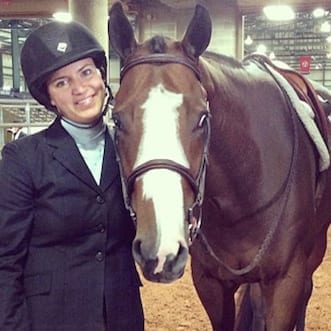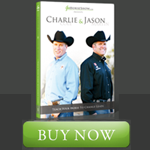GoHorseShow.com is pleased to feature the fourth installment of Sarah Elder Chabot’s five-part series, Working It. An amateur exhibitor on the AQHA circuit, Chabot offers tips on how to make showing work on a limited budget. Look out for her last article in the series about maintaining mental focus.
Behind every great race car driver there is a an entire team comprised of a crew chief, mechanics, tire changers, assistants, sponsors, a public relations department, and I am sure an entourage of friends and supporters. It is no different in the horse world, as an amateur rider I may seem independent toting around my horse to shows with only a pup in my passenger side, but my reality is far from independent! Vets, farriers, trainers, chiropractors, friends, family, bosses, retailers, photographers…. The list goes on and on. Behind every point, blue ribbon and even pulled rails, my support team is there with me.
So why do you need a support team?
Unless you are the Leonardo DaVinci of the horse world, no one is an expert in all areas. So if you haven’t put your support team together take a look at those around you, see how they are contributing to your success and then thank them. If you see a hole, find someone to fill it.
Maybe it is my over-analyzing nature, but I break my support system down into three categories: Horse Health, Competitive and Emotional.
First and foremost, if your horse isn’t healthy, it cannot do the job you need it to in the arena, so I am heavily dependent on my “Horse Health Team”. My horse health team also understands my goals and what my horse needs to be capable of performing.
HORSE HEALTH TEAM
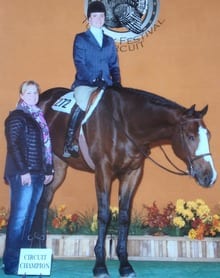 Vets – I actually have two vets that I work with to make sure Calvin is at his premium. Dr. Cindy Baccus is my go to for all health issues. She also competes on the quarter horse circuit as well, so, she stays on top of any virus or industry related issues. Dr. Phil Hammock is my soundness specialist. Both are always understanding of my goals and even happy to take calls and texts at anytime. Especially during this time as the Congress and World Shows near, they know that every day is critical for preparation.
Vets – I actually have two vets that I work with to make sure Calvin is at his premium. Dr. Cindy Baccus is my go to for all health issues. She also competes on the quarter horse circuit as well, so, she stays on top of any virus or industry related issues. Dr. Phil Hammock is my soundness specialist. Both are always understanding of my goals and even happy to take calls and texts at anytime. Especially during this time as the Congress and World Shows near, they know that every day is critical for preparation.
Farriers, Chiropractors and the like – Sometimes my parents think I am a bit overprotective when it comes to Calvin, but I would much rather address a problem early on than wait through something and end up with a bigger mess. So I really listen to the folks that see my horse every four to six weeks like my farrier – Josh Sullivan, and chiropractor – Dr. Elizabeth Schrader.
My Dad – So, Dad shows up on all three support teams, but as an AQHA Professional Horseman and just an all-around cowboy, my father has looked at more horses since the 1950’s then I ever will, before I make a decision I always run it past him. Sometimes good ole cowboy logic outweighs the modern trends.
The Trainer – Your trainer or coach is probably (or at least should be) the most concerned with your horse’s health. Since I keep my horse at my house, Karen Evans Mundy isn’t ultimately responsible for my horse’s health and well-being. However, she does advise on it. At each show, lesson or visit to her house, she always takes in Calvin’s weight, movement, the way his hooves look, hair coat and other physical properties. With her past success, she knows that a good looking and healthy horse is important to garner wins. (Pictured above left)
COMPETITIVE
My Competitive Team is made up of those folks who keep me on my toes and push me forward. They are people from the industry that know and understand what I need to do to reach my goals.
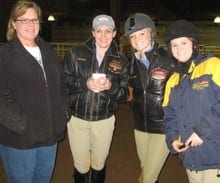 Best “Horse” Friends are important. You need people you can talk to that have no agenda, but totally understand where you are coming from. These are the people that you talk to when you are changing trainers or getting advice on what shows to go. I talk to them constantly about things that my spouse and other friends don’t have an interest in or can’t really follow along (disclaimer: Andy ends up hearing everything anyway). Honestly, on the way home from horse shows, I always call five people and give them the complete rundown and update – Jeremy Martin, Lydia Whitlow, Karen Kerch, Kat Clark, and Katie Bello. Each have their own connection to my horse showing past, different perspectives and unique insight. On top of everything, I don’t wear everyone else out that doesn’t really want to hear about how I am having trouble getting a getting-on step, or why my horse is stepping out of a forehand turn.
Best “Horse” Friends are important. You need people you can talk to that have no agenda, but totally understand where you are coming from. These are the people that you talk to when you are changing trainers or getting advice on what shows to go. I talk to them constantly about things that my spouse and other friends don’t have an interest in or can’t really follow along (disclaimer: Andy ends up hearing everything anyway). Honestly, on the way home from horse shows, I always call five people and give them the complete rundown and update – Jeremy Martin, Lydia Whitlow, Karen Kerch, Kat Clark, and Katie Bello. Each have their own connection to my horse showing past, different perspectives and unique insight. On top of everything, I don’t wear everyone else out that doesn’t really want to hear about how I am having trouble getting a getting-on step, or why my horse is stepping out of a forehand turn.
The Trainer – Notice this role is showing up in all categories as well. This should be obvious as a member of your competitive team. Your trainer must be completely dialed in to “YOUR” goals, not theirs. I love how Karen makes each of her students fill out a goal sheet that includes goals for this year and big dream goals as well. I have found that it is really important to be on the same page with your trainer about what type of competitive approaches you are taking.
EMOTIONAL TEAM
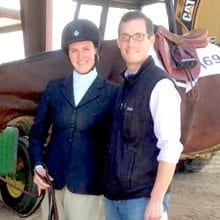 My emotional team is not just compiled to keep me from crying, but rather there for me at any emotional moment. Whether it is sharing happiness with a good ride, sadness over a disappointment or injury, or anger over unfairness or perception of it. My emotional team members are selected because they don’t add fuel to the flame, but rather, in my time of need, they provide balance and perspective.
My emotional team is not just compiled to keep me from crying, but rather there for me at any emotional moment. Whether it is sharing happiness with a good ride, sadness over a disappointment or injury, or anger over unfairness or perception of it. My emotional team members are selected because they don’t add fuel to the flame, but rather, in my time of need, they provide balance and perspective.
Spouse – I have a very supportive husband. He is a competitor in his own right as a runner. After eight marathons and countless halves and other runs, Andy understands wins, losses, training, injuries, and competition. He understands that it is emotional and the ability to control the emotion and put it to the best use is what makes us compete at our best. He is slow to criticize, quick to praise, but yet, never letting me get too big for my britches! (pictured right)
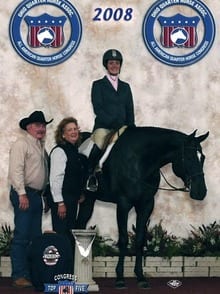 Parents – In my opinion, parents can be the best and the worst members of this team. Mine fall into the best as a working Amateur. They know what I am working for, keep things in perspective and always answer my call. I am what you call parent dependent and very proud of the title. My parents, Roger and Sandra Elder, have spent years on the road with me, and they know just how to support me when competing. But, I have seen instances where parents are too close and too involved which can create problems for the competitor. Parents have to be careful not to baby too much, not to tear down, and not to support crazy or extreme emotion. My mom was always the first person to tell me to stop crying, and I will be forever thankful that she understands when tears are appropriate and when they aren’t. (Pictured left her parents, Roger and Sandra Elder)
Parents – In my opinion, parents can be the best and the worst members of this team. Mine fall into the best as a working Amateur. They know what I am working for, keep things in perspective and always answer my call. I am what you call parent dependent and very proud of the title. My parents, Roger and Sandra Elder, have spent years on the road with me, and they know just how to support me when competing. But, I have seen instances where parents are too close and too involved which can create problems for the competitor. Parents have to be careful not to baby too much, not to tear down, and not to support crazy or extreme emotion. My mom was always the first person to tell me to stop crying, and I will be forever thankful that she understands when tears are appropriate and when they aren’t. (Pictured left her parents, Roger and Sandra Elder)
The Trainer – Your trainer fits into this team as well. While you are preparing for your class going into the Congress or the World Show, your success doesn’t hang on friends wishing you luck or parents asking if you need a glass of water. You need you, your horse, and your trainer focused on the preparation. That being said, your shouldn’t allow your trainer to pull you down either. This is the moment when your coach or trainer is pushing you to do your best, supporting and finding the positive when things seem to be going off course. You and your trainer need to spend enough time together that you work out all emotion kinks and when it is show time, you are emotionally on the same page and focused.
Whether you are accepting an Oscar or a World Champion Trophy, the path to get there is wrought with challenges and victories and you will need a support team that understands the journey to help get you there. Thanks to Team Calvin—you know who you are and what you do.
About Sarah Elder Chabot:
Competing on the AQHA circuit for more than 20 years, Sarah Elder Chabot has grown up showing American Quarter Horses in all classes from the hunter ring to the roping pen. With a diverse background in showing, Sarah is also a past contributor for the American Quarter Horse Journal, GoHorseShow.com and other equine publications. She currently competes on her horse, A Well Dressed Man, in amateur hunter classes, and can be seen traveling around with her favorite companion Elise, an Irish Jack Russell and her ever supportive husband, Andy. Outside of showing horses, you may see Sarah putting in a quick run, traveling to far off lands, and tasting great wine–all a part of her day job!


